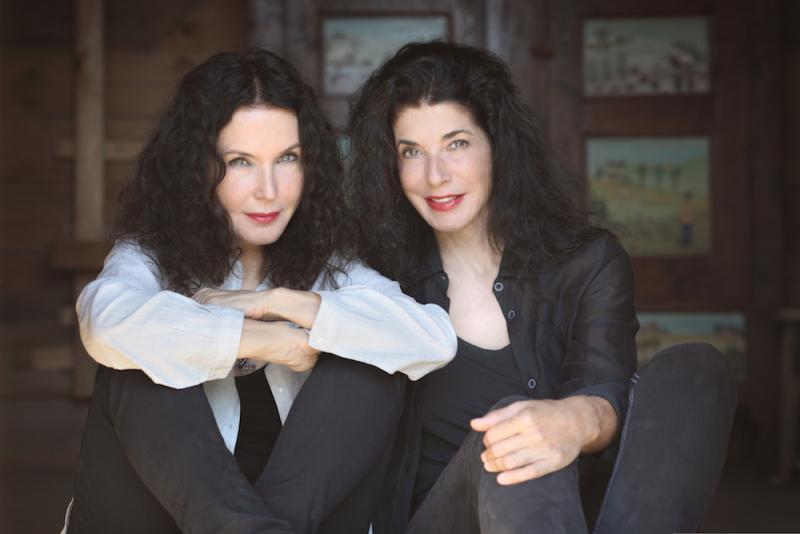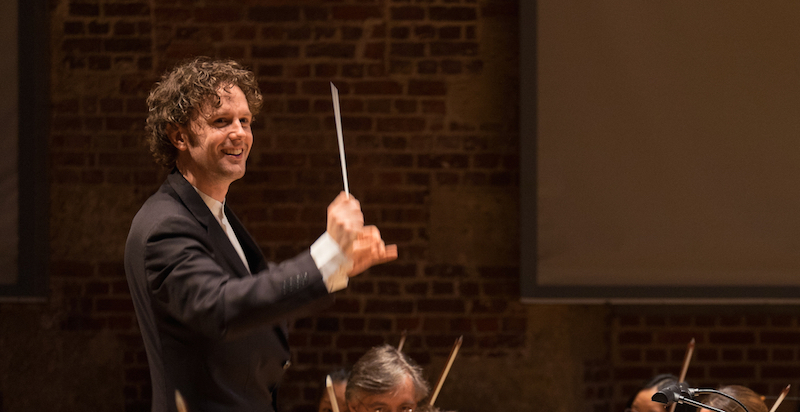Labèques, Aurora Orchestra, Collon, Kings Place review - good-natured Schubert and Mozart delight | reviews, news & interviews
Labèques, Aurora Orchestra, Collon, Kings Place review - good-natured Schubert and Mozart delight
Labèques, Aurora Orchestra, Collon, Kings Place review - good-natured Schubert and Mozart delight
French pianists battle a noisy audience but the music wins out

The Aurora Orchestra at Kings Place last night showcased both the best and worst things about attending live concerts, with the pros outweighing the cons. Early on, extraneous noise made me long for the pure listening experience of a good pair of headphones, but elsewhere the immediacy and physicality of the live experience was genuinely exciting.
This latest edition of Aurora’s multi-season survey of Mozart piano concertos featured the Labèque sisters, Katia and Marielle, who have been taking duet and two-piano repertoire around the world for over 30 years, in the concerto for two pianos, K.365.
But they began alone on stage, playing Ravel’s Mother Goose Suite in its original piano duet version. This hushed, deceptively simple music was augmented by an array of coughing that might have graced a tuberculosis ward. And in case the performance hadn’t already been thoroughly ruined, a phone ring that went on uncurtailed for about 20 seconds just drove the point home. The playing was far from faultless, but if the noise distracted me it must certainly have distracted the performers. There were some striking pedalling effects and carefully voiced inner parts, but a thoughtful performance was wasted.
At this stage a long evening stretched ahead, but things got better and better as the show went on, the players warmed up, and the audience settled down. In a previous concert in this series I felt the programme, although enterprising, did not hang together entirely convincingly. Here, though, there was much more of a thread. The sibling theme, personified in the Labèques, was reflected in the Ravel, written for a brother and sister to play (children of Ravel’s friends), as was Mozart’s two-piano concerto. In his case the other pianist was his sister Nannerl, a child prodigy like Wolfgang, but denied his career by the mores of the time. It is impossible to hear the concerto without feeling something of the Mozart sibling bond, as phrases are tossed from one piano to the other, the pianists finishing off each other’s ideas, dovetailing together instead of the conflict usually at the heart of a classical concerto.
The sibling theme, personified in the Labèques, was reflected in the Ravel, written for a brother and sister to play (children of Ravel’s friends), as was Mozart’s two-piano concerto. In his case the other pianist was his sister Nannerl, a child prodigy like Wolfgang, but denied his career by the mores of the time. It is impossible to hear the concerto without feeling something of the Mozart sibling bond, as phrases are tossed from one piano to the other, the pianists finishing off each other’s ideas, dovetailing together instead of the conflict usually at the heart of a classical concerto.
The piano playing was again not without blemish, but there was so much to enjoy it didn’t matter. The Labèques’ tone was so well matched that in interlocking passagework they sounded like a single “super-pianist”, and there were wonderful feats of co-ordination, such as the end of the first movement cadenza. In the slow movement, oboist Thomas Barber shaped his long notes beautifully. The youthful joy in the music was palpable in the playing, and the moments of sternness felt only skin deep, geniality being the watchword.
It’s not an especially easy piece to love, but Aurora found grace as well as fizz
The sense of community amongst the orchestra was also great to see. Conductor Nicholas Collon (pictured above) steered the ship with a light touch, and the experience the orchestra have of playing symphonies from memory seems to have made its mark in terms of the amount of eye contact and physical communication between the players. The entire string section play with a smile on their faces, none more so than principal viola Sascha Bota, who is a joy to watch (and hear), living every moment, every switch of character, revelling in the middle part of the texture, and showing that, even for professionals, playing music can remain fun. In that vein, it was great to see the Labèques join the audience for the second half, even though their work was done.
Stravinsky’s Concerto in D is a mini-Brandenburg for strings alone, edgier and more astringent than the earlier Dumbarton Oaks concerto. It’s not an especially easy piece to love, but Aurora found grace as well as fizz, playing the piece like chamber music. I’d be interested to hear them play it without music, and possibly – no disrespect to Collon – without a conductor. The basses acquitted themselves well in an unforgiving part, and the ending is one of Stravinsky’s best. This performance was something of a revelation.
There was even better to come, and the programme’s thread was further drawn out. Schubert’s Fifth Symphony is very much a tribute to Mozart, a charming piece, charmingly played. Collon really enjoyed himself, capturing its amiable character in his gestures, warmly inviting players to join the conversation, but finding incisiveness when it was needed in the third movement. The orchestra were completely responsive, singing with one voice, and clearly enjoying their work.
After the Schubert Collon spoke to the audience – and could perhaps have done so earlier as he has a very natural way of speaking – describing Aurora’s large and expanding work with young people. But so as not to end with the sound of his voice soliciting donations, there was an orchestral arrangement of one of Schubert’s Moments Musicaux (No. 3) as a lovely afterthought.
rating
Explore topics
Share this article
The future of Arts Journalism
You can stop theartsdesk.com closing!
We urgently need financing to survive. Our fundraising drive has thus far raised £49,000 but we need to reach £100,000 or we will be forced to close. Please contribute here: https://gofund.me/c3f6033d
And if you can forward this information to anyone who might assist, we’d be grateful.

Subscribe to theartsdesk.com
Thank you for continuing to read our work on theartsdesk.com. For unlimited access to every article in its entirety, including our archive of more than 15,000 pieces, we're asking for £5 per month or £40 per year. We feel it's a very good deal, and hope you do too.
To take a subscription now simply click here.
And if you're looking for that extra gift for a friend or family member, why not treat them to a theartsdesk.com gift subscription?
more Classical music
 Bizet in 150th anniversary year: rich and rare French offerings from Palazzetto Bru Zane
Specialists in French romantic music unveil a treasure trove both live and on disc
Bizet in 150th anniversary year: rich and rare French offerings from Palazzetto Bru Zane
Specialists in French romantic music unveil a treasure trove both live and on disc
 Scottish Chamber Orchestra, Ibragimova, Queen’s Hall, Edinburgh review - rarities, novelties and drumrolls
A pity the SCO didn't pick a better showcase for a shining guest artist
Scottish Chamber Orchestra, Ibragimova, Queen’s Hall, Edinburgh review - rarities, novelties and drumrolls
A pity the SCO didn't pick a better showcase for a shining guest artist
 Kilsby, Parkes, Sinfonia of London, Wilson, Barbican review - string things zing and sing in expert hands
British masterpieces for strings plus other-worldly tenor and horn - and a muscular rarity
Kilsby, Parkes, Sinfonia of London, Wilson, Barbican review - string things zing and sing in expert hands
British masterpieces for strings plus other-worldly tenor and horn - and a muscular rarity
 From Historical to Hip-Hop, Classically Black Music Festival, Kings Place review - a cluster of impressive stars for the future
From quasi-Mozartian elegance to the gritty humour of a kitchen inspection
From Historical to Hip-Hop, Classically Black Music Festival, Kings Place review - a cluster of impressive stars for the future
From quasi-Mozartian elegance to the gritty humour of a kitchen inspection
 Shibe, LSO, Adès, Barbican review - gaudy and glorious new music alongside serene Sibelius
Adès’s passion makes persuasive case for the music he loves, both new and old
Shibe, LSO, Adès, Barbican review - gaudy and glorious new music alongside serene Sibelius
Adès’s passion makes persuasive case for the music he loves, both new and old
 Anja Mittermüller, Richard Fu, Wigmore Hall review - a glorious hall debut
The Austrian mezzo shines - at the age of 22
Anja Mittermüller, Richard Fu, Wigmore Hall review - a glorious hall debut
The Austrian mezzo shines - at the age of 22
 First Person: clarinettist Oliver Pashley on the new horizons of The Hermes Experiment's latest album
Compositions by members of this unusual quartet feature for the first time
First Person: clarinettist Oliver Pashley on the new horizons of The Hermes Experiment's latest album
Compositions by members of this unusual quartet feature for the first time
 Gesualdo Passione, Les Arts Florissants, Amala Dior Company, Barbican review - inspired collaboration excavates the music's humanity
At times it was like watching an anarchic religious procession
Gesualdo Passione, Les Arts Florissants, Amala Dior Company, Barbican review - inspired collaboration excavates the music's humanity
At times it was like watching an anarchic religious procession
 Classical CDs: Camels, concrete and cabaret
An influential American composer's 90th birthday box, plus British piano concertos and a father-and-son duo
Classical CDs: Camels, concrete and cabaret
An influential American composer's 90th birthday box, plus British piano concertos and a father-and-son duo
 Cockerham, Manchester Camerata, Sheen, Martin Harris Centre, Manchester review - re-enacting the dawn of modernism
Two UK premieres added to three miniatures from a seminal event of January 1914
Cockerham, Manchester Camerata, Sheen, Martin Harris Centre, Manchester review - re-enacting the dawn of modernism
Two UK premieres added to three miniatures from a seminal event of January 1914
 Kempf, Brno Philharmonic, Davies, Bridgewater Hall, Manchester review - European tradition meets American jazz
Bouncing Czechs enjoy their Gershwin and Brubeck alongside Janáček and Dvořák
Kempf, Brno Philharmonic, Davies, Bridgewater Hall, Manchester review - European tradition meets American jazz
Bouncing Czechs enjoy their Gershwin and Brubeck alongside Janáček and Dvořák
 Solomon, OAE, Butt, QEH review - daft Biblical whitewashing with great choruses
Even a top soprano and mezzo can’t make this Handel paean wholly convincing
Solomon, OAE, Butt, QEH review - daft Biblical whitewashing with great choruses
Even a top soprano and mezzo can’t make this Handel paean wholly convincing

Add comment